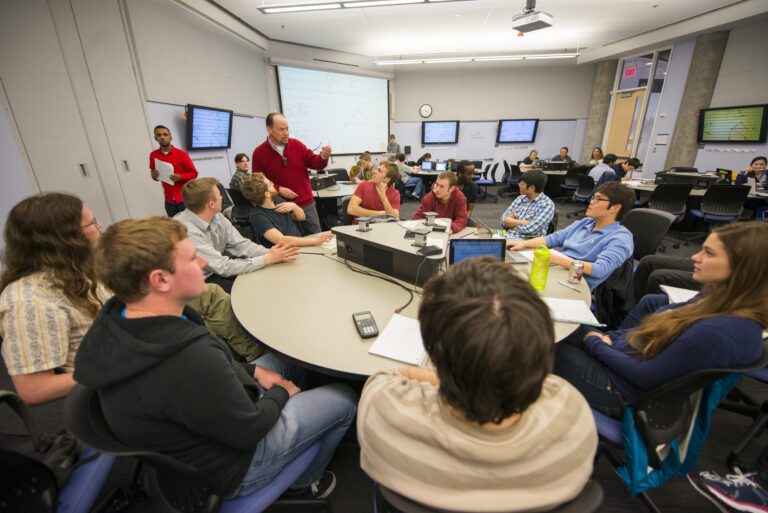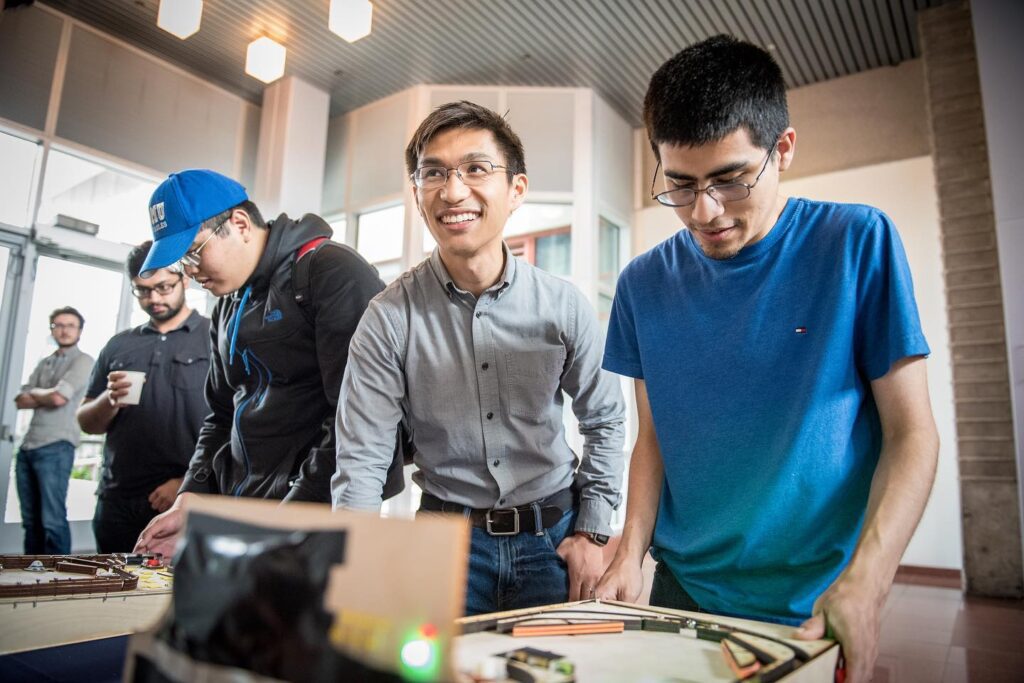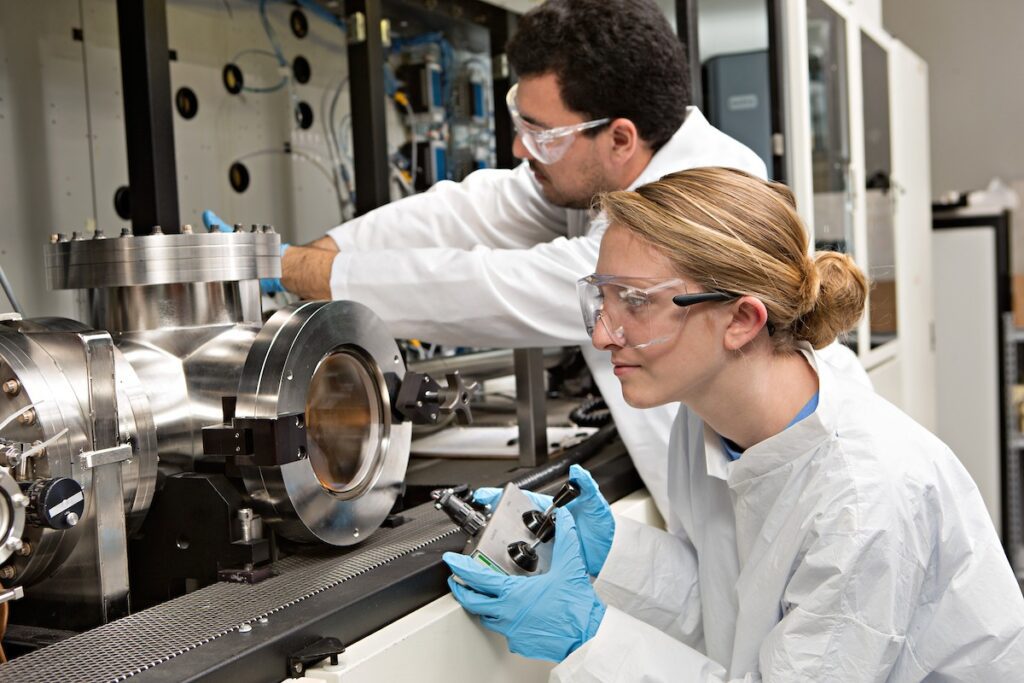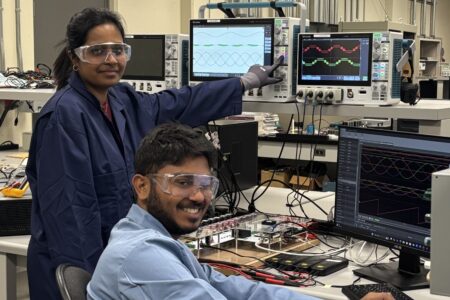
From Mars rovers to smart prosthetics, the advances in electrical and computer engineering (ECE) are powering the future. At the heart of it all are the engineers who can think bigger, move faster, and solve problems that haven’t been invented yet.
By 2034, the ECE field is set to grow by 7%, adding over 22,000 new roles. To gain an edge and land a role with impact, leadership skills matter. Today’s most consequential companies seek top engineers who can manage teams, drive innovation, and shape strategy.
That’s where a master’s comes in. The best ECE master’s programmes today expand your technical know-how while giving you the tools to tackle advanced systems, collaborate across disciplines, and shape the direction of entire departments, if not industries.
If you’re ready to move from contributor to changemaker, these four universities offer the launchpad to get you there.

MSECE students have access to the Minnesota Nano Center which has equipment for research in areas of nanotechnology such as small-scale devices, nano materials, and biomedical applications of nanotechnology. Source: University of Minnesota
University of Minnesota Twin Cities
The University of Minnesota Twin Cities is located in the heart of the Minneapolis-Saint Paul metropolitan area, where opportunities to collaborate with industry abound. Often referred to simply as the Twin Cities, the area has an incredibly strong and diversified business climate with companies across a mix of sectors that includes information technology, clean energy, medical devices, biosciences, water technology, and manufacturing. The Twin Cities are also home to 17 Fortune 500 companies.
This dynamic ecosystem directly benefits the university’s Department of Electrical and Computer Engineering. Programmes offered consistently rank among the top 20 in the US. The Department of Electrical and Computer Engineering at the University offers programmes that are consistently ranked among the top 20 in the US.
The Master of Science in Electrical and Computer Engineering (MSECE) is one of them. This master’s degree equips you with specialised skills in both foundational and emerging areas, including VLSI design, RF/microwave, optics and photonics, communications, signal and image processing, automation and control, power and renewable energy, and microelectronics and nanostructures.
Whichever your specialisation, your knowledge and skills will expand your opportunities in various sectors, spanning renewable energy, biomedical devices, computer systems, communications, nanotechnology, robotics, AI, and beyond. Graduates from the department’s programmes have gone on to work in Fortune 500 companies, including Microsoft, Google, Apple, Seagate, IBM, Nvidia, and Intel, plus successful startups.
In fact, the university is the national leader in startup creation, ranking among the top four universities in the country for four consecutive years. It is consistently in the top 15 public universities in the US for five key technology transfer metrics tracked by the Association of University Technology Managers: startups, invention disclosures, deals/new licenses, new patent applications, and license income.
Access to state-of-the-art facilities like the Minnesota Nano Center adds another layer of advantage. It is home to over US$30 million of equipment in place and operational to support the fabrication, synthesis, and characterisation of nanoscale devices and materials for both academic and industrial users.

The University of California San Diego’s ECE department is built on the fundamentals of applied mathematics and engineering physics. Source: UC San Diego Electrical and Computer Engineering/Facebook
University of California San Diego
The Centre for World University Rankings (CWUR) named the University of California San Diego as the world’s 20th-best university, while its campus ranks 16th among US universities. The university’s Jacobs School of Engineering offers graduate programs leading to MS and PhD degrees in 13 electrical and computer engineering disciplines. The Electrical and Computer Engineering (ECE) department includes over 60 faculty members heading exciting research in signal and image processing, machine learning and data science, intelligent systems, robotics and control, and more.
The school’s ECE department has a history that traces back to 1965, under its founding chair Henry Booker. It began with the Department of Applied Electrophysics, which became Applied Physics & Information Science, then Electrical Engineering and Computer Science, and finally, ECE. The vision for the school began with a focus on information and communication theory and systems, radio physics, and quantum electronics.
As the department is built on the fundamentals of applied mathematics and engineering physics, students receive multidisciplinary, systems-oriented education and research in 11 core areas. These are Applied Ocean Sciences, Computer Engineering, Communication Theory and Systems, Electronic Circuits and Systems, Electronic Devices and Materials, Intelligent Systems, Robotics and Control, Medical Devices and Systems, Nanoscale Devices and Systems, Photonics, Radio and Space Science, and Signal and Image Processing.

At the Electrical & Computer Engineering department, you have the opportunity to carry out award-winning research in state-of-the-art facilities. Source: ECE Florida
University of Florida
The University of Florida describes itself as an intellectual theme park, where students, educators, and industry leaders come together to address today’s global issues. It also helps that there are approximately 180 approved research centres and institutes scattered around the campus, nine of which belong to the Electrical & Computer Engineering department.
You will carry out award-winning research in these facilities, like exploring Assistant Professor Yingying Wu‘s work on developing new quantum hardware devices that use skyrmions or Assistant Professor Laura Kim‘s research on making quantum effects work at room temperature. Both received the Young Faculty Award courtesy of the National Science Foundation (NSF) and the Defence Advanced Research Projects Agency (DARPA) in 2025.
At this public university ranked #14 by US News & World Report, you can pursue a master’s degree with a thesis and non-thesis option. Foundational courses cover concepts and techniques essential for graduates to continue to learn and adapt to new technical knowledge and technologies in their lifetimes. Graduate tracks add deeper understanding in Computer Architecture, Computer Systems, Hardware/Systems Security, Internet of Things/Networking, Communications, Controls, Signal Processing, Machine Learning and AI, RF and Power Electronics, Electronic Integrated Circuits, Nano and Quantum Devices, Microsystems Technology, and E&M, Power and Optics.
Whichever track you choose, your training will set you up to follow the footsteps of past graduates. These alumni are now working for top companies, such as IBM, Texas Instruments, Samsung, and even McDonald’s.

Million-dollar investments and state-of-the-art equipment allow Texas A&M University ECE students to discover and invent innovative solutions in the electrical and computer engineering field. Source: UC San Diego Electrical and Computer Engineering/Facebook
Texas A&M University
Choosing to attend the Department of Electrical and Computer Engineering at Texas A&M University means embarking on an exciting journey with seemingly endless opportunities to help shape the future. With a bold investment of US$250 million for a Semiconductor Institute, a state-of-the-art US$45 million GPU cluster, and the strategic hiring of 20 world-class faculty members, the department is transforming into a hub of innovation.
At Texas A&M, students don’t just learn, they lead. Every day is a chance to amass new knowledge – by discovering and inventing innovative solutions in the electrical and computer engineering field.
The department offers two diverse master’s degrees that complement each other and are ranked #13 among public institution graduate programmes. The Master of Science – Electrical Engineering has both thesis and non-thesis options (the former will involve cutting-edge research and prepare you for careers in industry or pursuing a doctoral degree). From designing and developing electrical and communication systems to managing engineering projects and specialising in areas like renewable energy, semiconductors, analogue circuits, or biomedical devices, the MS sets you up for industry careers and doctoral pathways in areas of technological progress.
Meanwhile, the Master of Science – Computer Engineering gives you an advanced understanding of the core concepts that underlie computing hardware, software and systems. Graduates can pursue fields such as image and signal processing, embedded systems, digital system design and automation, and computer systems and networks. As AI, machine learning, and cybersecurity rise as some of the most in-demand skills today, a master’s degree in computer engineering will put you at the forefront, leading the ever-growing industry and beyond.
*Some of the institutions featured in this article are commercial partners of Study International









